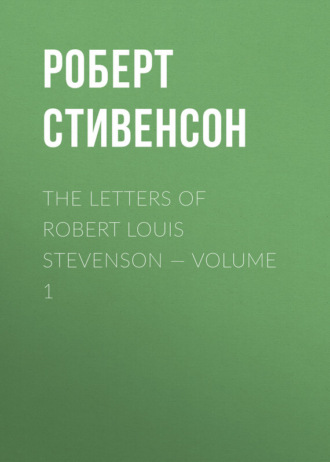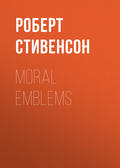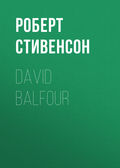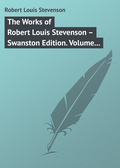
Роберт Льюис Стивенсон
The Letters of Robert Louis Stevenson — Volume 1
ROBERT LOUIS STEVENSON.
Letter: TO EDMUND GOSSE
BONALLIE TOWERS, BOURNEMOUTH, MARCH 12, 1885
MY DEAR GOSSE, — I was indeed much exercised how I could be worked into Gray; and lo! when I saw it, the passage seemed to have been written with a single eye to elucidate the — worst? — well, not a very good poem of Gray's. Your little life is excellent, clean, neat, efficient. I have read many of your notes, too, with pleasure. Your connection with Gray was a happy circumstance; it was a suitable conjunction.
I did not answer your letter from the States, for what was I to say? I liked getting it and reading it; I was rather flattered that you wrote it to me; and then I'll tell you what I did — I put it in the fire. Why? Well, just because it was very natural and expansive; and thinks I to myself, if I die one of these fine nights, this is just the letter that Gosse would not wish to go into the hands of third parties. Was I well inspired? And I did not answer it because you were in your high places, sailing with supreme dominion, and seeing life in a particular glory; and I was peddling in a corner, confined to the house, overwhelmed with necessary work, which I was not always doing well, and, in the very mild form in which the disease approaches me, touched with a sort of bustling cynicism. Why throw cold water? How ape your agreeable frame of mind? In short, I held my tongue.
I have now published on 101 small pages THE COMPLETE PROOF OF MR. R. L. STEVENSON'S INCAPACITY TO WRITE VERSE, in a series of graduated examples with table of contents. I think I shall issue a companion volume of exercises: 'Analyse this poem. Collect and comminate the ugly words. Distinguish and condemn the CHEVILLES. State Mr. Stevenson's faults of taste in regard to the measure. What reasons can you gather from this example for your belief that Mr. S. is unable to write any other measure?'
They look ghastly in the cold light of print; but there is something nice in the little ragged regiment for all; the blackguards seem to me to smile, to have a kind of childish treble note that sounds in my ears freshly; not song, if you will, but a child's voice.
I was glad you enjoyed your visit to the States. Most Englishmen go there with a confirmed design of patronage, as they go to France for that matter; and patronage will not pay. Besides, in this year of — grace, said I? — of disgrace, who should creep so low as an Englishman? 'It is not to be thought of that the flood' — ah, Wordsworth, you would change your note were you alive to-day!
I am now a beastly householder, but have not yet entered on my domain. When I do, the social revolution will probably cast me back upon my dung heap. There is a person called Hyndman whose eye is on me; his step is beHynd me as I go. I shall call my house Skerryvore when I get it: SKERRYVORE: C'EST BON POUR LA POESHIE. I will conclude with my favourite sentiment: 'The world is too much with me.'
ROBERT LOUIS STEVENSON, THE HERMIT OF SKERRYVORE.
Author of 'John Vane Tempest: a Romance,' 'Herbert and Henrietta: or the Nemesis of Sentiment,' 'The Life and Adventures of Colonel Bludyer Fortescue,' 'Happy Homes and Hairy Faces,' 'A Pound of Feathers and a Pound of Lead,' part author of 'Minn's Complete Capricious Correspondent: a Manual of Natty, Natural, and Knowing Letters,' and editor of the 'Poetical Remains of Samuel Burt Crabbe, known as the melodious Bottle-Holder.'
Uniform with the above:
'The Life and Remains of the Reverend Jacob Degray Squah,' author of 'Heave-yo for the New Jerusalem.' 'A Box of Candles; or the Patent Spiritual Safety Match,' and 'A Day with the Heavenly Harriers.'
Letter: TO W. H. LOW
BONALLIE TOWERS, BOURNEMOUTH, MARCH 13, 1885
MY DEAR LOW, — Your success has been immense. I wish your letter had come two days ago: OTTO, alas! has been disposed of a good while ago; but it was only day before yesterday that I settled the new volume of Arabs. However, for the future, you and the sons of the deified Scribner are the men for me. Really they have behaved most handsomely. I cannot lay my hand on the papers, or I would tell you exactly how it compares with my English bargain; but it compares well. Ah, if we had that copyright, I do believe it would go far to make me solvent, ill-health and all.
I wrote you a letter to the Rembrandt, in which I stated my views about the dedication in a very brief form. It will give me sincere pleasure, and will make the second dedication I have received, the other being from John Addington Symonds. It is a compliment I value much; I don't know any that I should prefer.
I am glad to hear you have windows to do; that is a fine business, I think; but, alas! the glass is so bad nowadays; realism invading even that, as well as the huge inferiority of our technical resource corrupting every tint. Still, anything that keeps a man to decoration is, in this age, good for the artist's spirit.
By the way, have you seen James and me on the novel? James, I think in the August or September — R. L. S. in the December LONGMAN. I own I think the ECOLE BETE, of which I am the champion, has the whip hand of the argument; but as James is to make a rejoinder, I must not boast. Anyway the controversy is amusing to see. I was terribly tied down to space, which has made the end congested and dull. I shall see if I can afford to send you the April CONTEMPORARY — but I dare say you see it anyway — as it will contain a paper of mine on style, a sort of continuation of old arguments on art in which you have wagged a most effective tongue. It is a sort of start upon my Treatise on the Art of Literature: a small, arid book that shall some day appear.
With every good wish from me and mine (should I not say 'she and hers'?) to you and yours, believe me yours ever,
ROBERT LOUIS STEVENSON.
Letter: TO P. G. HAMERTON
BOURNEMOUTH, MARCH 16, 1885
MY DEAR HAMERTON, — Various things have been reminding me of my misconduct: First, Swan's application for your address; second, a sight of the sheets of your LANDSCAPE book; and last, your note to Swan, which he was so kind as to forward. I trust you will never suppose me to be guilty of anything more serious than an idleness, partially excusable. My ill-health makes my rate of life heavier than I can well meet, and yet stops me from earning more. My conscience, sometimes perhaps too easily stifled, but still (for my time of life and the public manners of the age) fairly well alive, forces me to perpetual and almost endless transcriptions. On the back of all this, my correspondence hangs like a thundercloud; and just when I think I am getting through my troubles, crack, down goes my health, I have a long, costly sickness, and begin the world again. It is fortunate for me I have a father, or I should long ago have died; but the opportunity of the aid makes the necessity none the more welcome. My father has presented me with a beautiful house here — or so I believe, for I have not yet seen it, being a cage bird but for nocturnal sorties in the garden. I hope we shall soon move into it, and I tell myself that some day perhaps we may have the pleasure of seeing you as our guest. I trust at least that you will take me as I am, a thoroughly bad correspondent, and a man, a hater, indeed, of rudeness in others, but too often rude in all unconsciousness himself; and that you will never cease to believe the sincere sympathy and admiration that I feel for you and for your work.
About the LANDSCAPE, which I had a glimpse of while a friend of mine was preparing a review, I was greatly interested, and could write and wrangle for a year on every page; one passage particularly delighted me, the part about Ulysses — jolly. Then, you know, that is just what I fear I have come to think landscape ought to be in literature; so there we should be at odds. Or perhaps not so much as I suppose, as Montaigne says it is a pot with two handles, and I own I am wedded to the technical handle, which (I likewise own and freely) you do well to keep for a mistress. I should much like to talk with you about some other points; it is only in talk that one gets to understand. Your delightful Wordsworth trap I have tried on two hardened Wordsworthians, not that I am not one myself. By covering up the context, and asking them to guess what the passage was, both (and both are very clever people, one a writer, one a painter) pronounced it a guide-book. 'Do you think it an unusually good guide-book?' I asked, and both said, 'No, not at all!' Their grimace was a picture when I showed the original.
I trust your health and that of Mrs. Hamerton keep better; your last account was a poor one. I was unable to make out the visit I had hoped, as (I do not know if you heard of it) I had a very violent and dangerous haemorrhage last spring. I am almost glad to have seen death so close with all my wits about me, and not in the customary lassitude and disenchantment of disease. Even thus clearly beheld I find him not so terrible as we suppose. But, indeed, with the passing of years, the decay of strength, the loss of all my old active and pleasant habits, there grows more and more upon me that belief in the kindness of this scheme of things, and the goodness of our veiled God, which is an excellent and pacifying compensation. I trust, if your health continues to trouble you, you may find some of the same belief. But perhaps my fine discovery is a piece of art, and belongs to a character cowardly, intolerant of certain feelings, and apt to self-deception. I don't think so, however; and when I feel what a weak and fallible vessel I was thrust into this hurly-burly, and with what marvellous kindness the wind has been tempered to my frailties, I think I should be a strange kind of ass to feel anything but gratitude.
I do not know why I should inflict this talk upon you; but when I summon the rebellous pen, he must go his own way; I am no Michael Scott, to rule the fiend of correspondence. Most days he will none of me; and when he comes, it is to rape me where he will. — Yours very sincerely,
ROBERT LOUIS STEVENSON.
Letter: TO WILLIAM ARCHER
BOURNEMOUTH, MARCH 29, 1885
DEAR MR. ARCHER, — Yes, I have heard of you and read some of your work; but I am bound in particular to thank you for the notice of my verses. 'There,' I said, throwing it over to the friend who was staying with me, 'it's worth writing a book to draw an article like that.' Had you been as hard upon me as you were amiable, I try to tell myself I should have been no blinder to the merits of your notice. For I saw there, to admire and to be very grateful for, a most sober, agile pen; an enviable touch; the marks of a reader, such as one imagines for one's self in dreams, thoughtful, critical, and kind; and to put the top on this memorial column, a greater readiness to describe the author criticised than to display the talents of his censor.
I am a man BLASE to injudicious praise (though I hope some of it may be judicious too), but I have to thank you for THE BEST CRITICISM I EVER HAD; and am therefore, dear Mr. Archer, the most grateful critickee now extant.
ROBERT LOUIS STEVENSON.
P.S. — I congratulate you on living in the corner of all London that I like best. A PROPOS, you are very right about my voluntary aversion from the painful sides of life. My childhood was in reality a very mixed experience, full of fever, nightmare, insomnia, painful days and interminable nights; and I can speak with less authority of gardens than of that other 'land of counterpane.' But to what end should we renew these sorrows? The sufferings of life may be handled by the very greatest in their hours of insight; it is of its pleasures that our common poems should be formed; these are the experiences that we should seek to recall or to provoke; and I say with Thoreau, 'What right have I to complain, who have not ceased to wonder?' and, to add a rider of my own, who have no remedy to offer.
R. L. S.
Letter: TO MRS. FLEEMING JENKIN
[SKERRYVORE, BOURNEMOUTH, JUNE 1885.]
MY DEAR MRS. JENKIN, — You know how much and for how long I have loved, respected, and admired him; I am only able to feel a little with you. But I know how he would have wished us to feel. I never knew a better man, nor one to me more lovable; we shall all feel the loss more greatly as time goes on. It scarce seems life to me; what must it be to you? Yet one of the last things that he said to me was, that from all these sad bereavements of yours he had learned only more than ever to feel the goodness and what we, in our feebleness, call the support of God; he had been ripening so much — to other eyes than ours, we must suppose he was ripe, and try to feel it. I feel it is better not to say much more. It will be to me a great pride to write a notice of him: the last I can now do. What more in any way I can do for you, please to think and let me know. For his sake and for your own, I would not be a useless friend: I know, you know me a most warm one; please command me or my wife, in any way. Do not trouble to write to me; Austin, I have no doubt, will do so, if you are, as I fear you will be, unfit.
My heart is sore for you. At least you know what you have been to him; how he cherished and admired you; how he was never so pleased as when he spoke of you; with what a boy's love, up to the last, he loved you. This surely is a consolation. Yours is the cruel part — to survive; you must try and not grudge to him his better fortune, to go first. It is the sad part of such relations that one must remain and suffer; I cannot see my poor Jenkin without you. Nor you indeed without him; but you may try to rejoice that he is spared that extremity. Perhaps I (as I was so much his confidant) know even better than you can do what your loss would have been to him; he never spoke of you but his face changed; it was — you were — his religion.
I write by this post to Austin and to the ACADEMY. — Yours most sincerely,
ROBERT LOUIS STEVENSON,
Letter: TO MRS. FLEEMING JENKIN
[SKERRYVORE, BOURNEMOUTH, JUNE 1885.]
MY DEAR MRS. JENKIN, — I should have written sooner, but we are in a bustle, and I have been very tired, though still well. Your very kind note was most welcome to me. I shall be very much pleased to have you call me Louis, as he has now done for so many years. Sixteen, you say? is it so long? It seems too short now; but of that we cannot judge, and must not complain.
I wish that either I or my wife could do anything for you; when we can, you will, I am sure, command us.
I trust that my notice gave you as little pain as was possible. I found I had so much to say, that I preferred to keep it for another place and make but a note in the ACADEMY. To try to draw my friend at greater length, and say what he was to me and his intimates, what a good influence in life and what an example, is a desire that grows upon me. It was strange, as I wrote the note, how his old tests and criticisms haunted me; and it reminded me afresh with every few words how much I owe to him.
I had a note from Henley, very brief and very sad. We none of us yet feel the loss; but we know what he would have said and wished.
Do you know that Dew Smith has two photographs of him, neither very bad? and one giving a lively, though not flattering air of him in conversation? If you have not got them, would you like me to write to Dew and ask him to give you proofs?
I was so pleased that he and my wife made friends; that is a great pleasure. We found and have preserved one fragment (the head) of the drawing he made and tore up when he was last here. He had promised to come and stay with us this summer. May we not hope, at least, some time soon to have one from you? — Believe me, my dear Mrs. Jenkin, with the most real sympathy, your sincere friend,
ROBERT LOUIS STEVENSON.
Dear me, what happiness I owe to both of you!
Letter: TO W. H. LOW
SKERRYVORE, BOURNEMOUTH, OCTOBER 22, 1885
MY DEAR LOW, — I trust you are not annoyed with me beyond forgiveness; for indeed my silence has been devilish prolonged. I can only tell you that I have been nearly six months (more than six) in a strange condition of collapse, when it was impossible to do any work, and difficult (more difficult than you would suppose) to write the merest note. I am now better, but not yet my own man in the way of brains, and in health only so-so. I suppose I shall learn (I begin to think I am learning) to fight this vast, vague feather-bed of an obsession that now overlies and smothers me; but in the beginnings of these conflicts, the inexperienced wrestler is always worsted, and I own I have been quite extinct. I wish you to know, though it can be no excuse, that you are not the only one of my friends by many whom I have thus neglected; and even now, having come so very late into the possession of myself, with a substantial capital of debts, and my work still moving with a desperate slowness — as a child might fill a sandbag with its little handfuls — and my future deeply pledged, there is almost a touch of virtue in my borrowing these hours to write to you. Why I said 'hours' I know not; it would look blue for both of us if I made good the word.
I was writing your address the other day, ordering a copy of my next, PRINCE OTTO, to go your way. I hope you have not seen it in parts; it was not meant to be so read; and only my poverty (dishonourably) consented to the serial evolution.
I will send you with this a copy of the English edition of the CHILD'S GARDEN. I have heard there is some vile rule of the post- office in the States against inscriptions; so I send herewith a piece of doggerel which Mr. Bunner may, if he thinks fit, copy off the fly leaf.
Sargent was down again and painted a portrait of me walking about in my own dining-room, in my own velveteen jacket, and twisting as I go my own moustache; at one corner a glimpse of my wife, in an Indian dress, and seated in a chair that was once my grandfather's; but since some months goes by the name of Henry James's, for it was there the novelist loved to sit — adds a touch of poesy and comicality. It is, I think, excellent, but is too eccentric to be exhibited. I am at one extreme corner; my wife, in this wild dress, and looking like a ghost, is at the extreme other end; between us an open door exhibits my palatial entrance hall and a part of my respected staircase. All this is touched in lovely, with that witty touch of Sargent's; but, of course, it looks dam queer as a whole.
Pray let me hear from you, and give me good news of yourself and your wife, to whom please remember me. -
Yours most sincerely, my dear Low,
ROBERT LOUIS STEVENSON.
Letter: TO W. E. HENLEY
[SKERRYVORE, BOURNEMOUTH, AUTUMN 1885.]
DEAR LAD, — If there was any more praise in what you wrote, I think [the editor] has done us both a service; some of it stops my throat. What, it would not have been the same if Dumas or Musset had done it, would it not? Well, no, I do not think it would, do you know, now; I am really of opinion it would not; and a dam good job too. Why, think what Musset would have made of Otto! Think how gallantly Dumas would have carried his crowd through! And whatever you do, don't quarrel with — . It gives me much pleasure to see your work there; I think you do yourself great justice in that field; and I would let no annoyance, petty or justifiable, debar me from such a market. I think you do good there. Whether (considering our intimate relations) you would not do better to refrain from reviewing me, I will leave to yourself: were it all on my side, you could foresee my answer; but there is your side also, where you must be the judge.
As for the SATURDAY. Otto is no 'fool,' the reader is left in no doubt as to whether or not Seraphina was a Messalina (though much it would matter, if you come to that); and therefore on both these points the reviewer has been unjust. Secondly, the romance lies precisely in the freeing of two spirits from these court intrigues; and here I think the reviewer showed himself dull. Lastly, if Otto's speech is offensive to him, he is one of the large class of unmanly and ungenerous dogs who arrogate and defile the name of manly. As for the passages quoted, I do confess that some of them reek Gongorically; they are excessive, but they are not inelegant after all. However, had he attacked me only there, he would have scored.
Your criticism on Gondremark is, I fancy, right. I thought all your criticisms were indeed; only your praise — chokes me. — Yours ever,
R. L. S.
Letter: TO WILLIAM ARCHER
SKERRYVORE, BOURNEMOUTH, OCTOBER 28, 1885
DEAR MR. ARCHER, — I have read your paper with my customary admiration; it is very witty, very adroit; it contains a great deal that is excellently true (particularly the parts about my stories and the description of me as an artist in life); but you will not be surprised if I do not think it altogether just. It seems to me, in particular, that you have wilfully read all my works in terms of my earliest; my aim, even in style, has quite changed in the last six or seven years; and this I should have thought you would have noticed. Again, your first remark upon the affectation of the italic names; a practice only followed in my two affected little books of travel, where a typographical MINAUDERIE of the sort appeared to me in character; and what you say of it, then, is quite just. But why should you forget yourself and use these same italics as an index to my theology some pages further on? This is lightness of touch indeed; may I say, it is almost sharpness of practice?
Excuse these remarks. I have been on the whole much interested, and sometimes amused. Are you aware that the praiser of this 'brave gymnasium' has not seen a canoe nor taken a long walk since '79? that he is rarely out of the house nowadays, and carries his arm in a sling? Can you imagine that he is a backslidden communist, and is sure he will go to hell (if there be such an excellent institution) for the luxury in which he lives? And can you believe that, though it is gaily expressed, the thought is hag and skeleton in every moment of vacuity or depression? Can you conceive how profoundly I am irritated by the opposite affectation to my own, when I see strong men and rich men bleating about their sorrows and the burthen of life, in a world full of 'cancerous paupers,' and poor sick children, and the fatally bereaved, ay, and down even to such happy creatures as myself, who has yet been obliged to strip himself, one after another, of all the pleasures that he had chosen except smoking (and the days of that I know in my heart ought to be over), I forgot eating, which I still enjoy, and who sees the circle of impotence closing very slowly but quite steadily around him? In my view, one dank, dispirited word is harmful, a crime of LESE- HUMANITE, a piece of acquired evil; every gay, every bright word or picture, like every pleasant air of music, is a piece of pleasure set afloat; the reader catches it, and, if he be healthy, goes on his way rejoicing; and it is the business of art so to send him, as often as possible.
For what you say, so kindly, so prettily, so precisely, of my style, I must in particular thank you; though even here, I am vexed you should not have remarked on my attempted change of manner: seemingly this attempt is still quite unsuccessful! Well, we shall fight it out on this line if it takes all summer.
And now for my last word: Mrs. Stevenson is very anxious that you should see me, and that she should see you, in the flesh. If you at all share in these views, I am a fixture. Write or telegraph (giving us time, however, to telegraph in reply, lest the day be impossible), and come down here to a bed and a dinner. What do you say, my dear critic? I shall be truly pleased to see you; and to explain at greater length what I meant by saying narrative was the most characteristic mood of literature, on which point I have great hopes I shall persuade you. — Yours truly,
ROBERT LOUIS STEVENSON.
P.S. — My opinion about Thoreau, and the passage in THE WEEK, is perhaps a fad, but it is sincere and stable. I am still of the same mind five years later; did you observe that I had said 'modern' authors? and will you observe again that this passage touches the very joint of our division? It is one that appeals to me, deals with that part of life that I think the most important, and you, if I gather rightly, so much less so? You believe in the extreme moment of the facts that humanity has acquired and is acquiring; I think them of moment, but still or much less than those inherent or inherited brute principles and laws that sit upon us (in the character of conscience) as heavy as a shirt of mail, and that (in the character of the affections and the airy spirit of pleasure) make all the light of our lives. The house is, indeed, a great thing, and should be rearranged on sanitary principles; but my heart and all my interest are with the dweller, that ancient of days and day-old infant man.
R. L. S.
An excellent touch is p. 584. 'By instinct or design he eschews what demands constructive patience.' I believe it is both; my theory is that literature must always be most at home in treating movement and change; hence I look for them.
Letter: TO THOMAS STEVENSON
[SKERRYVORE, BOURNEMOUTH,] OCTOBER 28, 1885
MY DEAREST FATHER, — Get the November number of TIME, and you will see a review of me by a very clever fellow, who is quite furious at bottom because I am too orthodox, just as Purcell was savage because I am not orthodox enough. I fall between two stools. It is odd, too, to see how this man thinks me a full-blooded fox- hunter, and tells me my philosophy would fail if I lost my health or had to give up exercise!
An illustrated TREASURE ISLAND will be out next month. I have had an early copy, and the French pictures are admirable. The artist has got his types up in Hogarth; he is full of fire and spirit, can draw and can compose, and has understood the book as I meant it, all but one or two little accidents, such as making the HISPANIOLA a brig. I would send you my copy, BUT I CANNOT; it is my new toy, and I cannot divorce myself from this enjoyment.
I am keeping really better, and have been out about every second day, though the weather is cold and very wild.
I was delighted to hear you were keeping better; you and Archer would agree, more shame to you! (Archer is my pessimist critic.) Good-bye to all of you, with my best love. We had a dreadful overhauling of my conduct as a son the other night; and my wife stripped me of my illusions and made me admit I had been a detestable bad one. Of one thing in particular she convicted me in my own eyes: I mean, a most unkind reticence, which hung on me then, and I confess still hangs on me now, when I try to assure you that I do love you. — Ever your bad son,
ROBERT LOUIS STEVENSON.
Letter: TO HENRY JAMES
SKERRYVORE, BOURNEMOUTH, OCTOBER 28, 1885
MY DEAR HENRY JAMES, — At last, my wife being at a concert, and a story being done, I am at some liberty to write and give you of my views. And first, many thanks for the works that came to my sickbed. And second, and more important, as to the PRINCESS. Well, I think you are going to do it this time; I cannot, of course, foresee, but these two first numbers seem to me picturesque and sound and full of lineament, and very much a new departure. As for your young lady, she is all there; yes, sir, you can do low life, I believe. The prison was excellent; it was of that nature of touch that I sometimes achingly miss from your former work; with some of the grime, that is, and some of the emphasis of skeleton there is in nature. I pray you to take grime in a good sense; it need not be ignoble: dirt may have dignity; in nature it usually has; and your prison was imposing.
And now to the main point: why do we not see you? Do not fail us. Make an alarming sacrifice, and let us see 'Henry James's chair' properly occupied. I never sit in it myself (though it was my grandfather's); it has been consecrated to guests by your approval, and now stands at my elbow gaping. We have a new room, too, to introduce to you — our last baby, the drawing-room; it never cries, and has cut its teeth. Likewise, there is a cat now. It promises to be a monster of laziness and self-sufficiency.
Pray see, in the November TIME (a dread name for a magazine of light reading), a very clever fellow, W. Archer, stating his views of me; the rosy-gilled 'athletico-aesthete'; and warning me, in a fatherly manner, that a rheumatic fever would try my philosophy (as indeed it would), and that my gospel would not do for 'those who are shut out from the exercise of any manly virtue save renunciation.' To those who know that rickety and cloistered spectre, the real R. L. S., the paper, besides being clever in itself, presents rare elements of sport. The critical parts are in particular very bright and neat, and often excellently true. Get it by all manner of means.
I hear on all sides I am to be attacked as an immoral writer; this is painful. Have I at last got, like you, to the pitch of being attacked? 'Tis the consecration I lack — and could do without. Not that Archer's paper is an attack, or what either he or I, I believe, would call one; 'tis the attacks on my morality (which I had thought a gem of the first water) I referred to.







